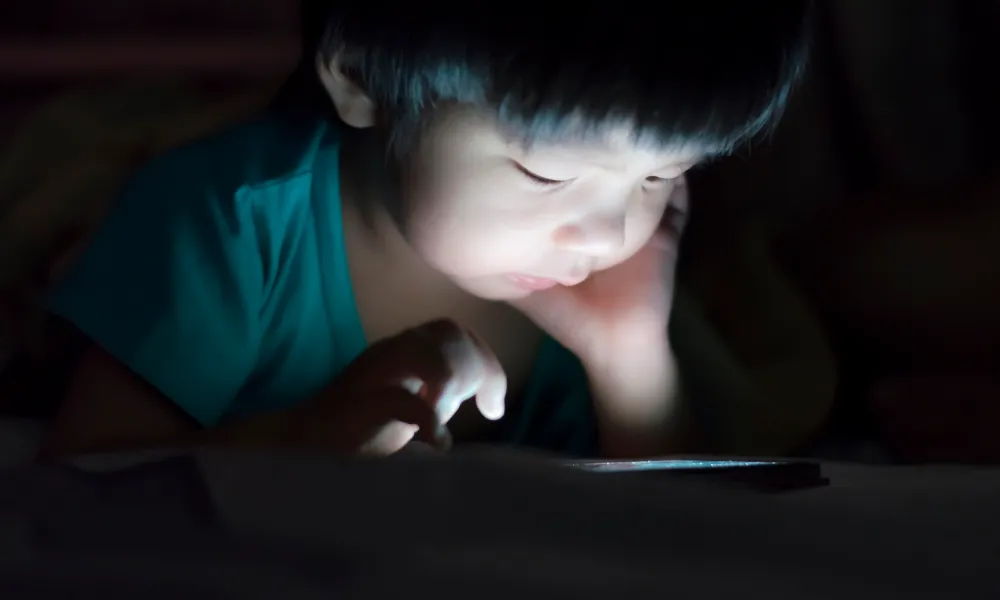Family
Study suggests too much screen time could lead to premature puberty

The findings of a recent study, which has not yet been peer-reviewed, may suggest that too much exposure to the blue light from tablets and smartphones could affect hormone levels and increase the probability of premature puberty.
The study, which was tested on rats, found that a prolonged exposure to the blue light was linked to the early onset of puberty in female rats, who also showed lower melatonin levels, elevated levels of several reproductive hormones, and physical changes to their ovaries.
The use of cell phones and other devices that emit a blue light has already been linked to children’s sleep patterns being disturbed, but current results suggest that there may be additional dangers for fetal development and future fertility, according to The Independent.
Jasmine Eskenzi, founder of The Zensory, a wellbeing and productivity app, commented on the subject: “We know smartphones can be damaging for kids’ health and wellbeing. However, we can’t change how digital natives are using technology – these cultural advances have happened, and we just have to try our best to use these tools for a positive use and to create healthy habits and behaviors.”
“There are ways of using smartphones in a positive way, to empower people to learn preventative mental health strategies such as mindfulness, meditation and positive thinking,” she adds, stating that technology can have many advantages, provided that there are boundaries and guidance in place.
“Young people can find like-minded communities, and also watch and engage with exercise classes and fitness content on their phones. If we can encourage young people to engage more with the healthy educational content, inspiring communities, and wildly empowering capabilities of smart phones – we can see young people thriving and not just surviving,” she added.
However, as New Atlas reports, some experts have advised against reading too much into this study.
Amy Orben of Cambridge warned: “This study done on rats give us little to no evidence about what would be found in human children.”
“Further, pure blue light exposure for long durations is not an accurate portrayal of young people’s screen use. This is especially the case for the 12 hours of blue light condition in the study, which would have made a very stressful environment for the rats,” Orben said.
Aylin Kilinc Ugurlu, one of the researcher who worked on the project, noted that this study was done on rats and it cannot yet be determined if the results are the same in human.
“As this a rat study, we can’t be sure that these findings would be replicated in children, but these data suggest that blue light exposure could be considered as a risk factor for earlier puberty onset. Although not conclusive, we would advise that the use of blue light emitting devices should be minimized in pre-pubertal children, especially in the evening when exposure may have the most hormone-altering effects,” Ugurlu said.
Terry A. Hurlbut has been a student of politics, philosophy, and science for more than 35 years. He is a graduate of Yale College and has served as a physician-level laboratory administrator in a 250-bed community hospital. He also is a serious student of the Bible, is conversant in its two primary original languages, and has followed the creation-science movement closely since 1993.
-

 Accountability3 days ago
Accountability3 days agoWaste of the Day: Principal Bought Lobster with School Funds
-

 Civilization1 day ago
Civilization1 day agoWhy Europe Shouldn’t Be Upset at Trump’s Venezuelan Actions
-

 Executive2 days ago
Executive2 days agoHow Relaxed COVID-Era Rules Fueled Minnesota’s Biggest Scam
-

 Constitution3 days ago
Constitution3 days agoTrump, Canada, and the Constitutional Problem Beneath the Bridge
-

 Christianity Today1 day ago
Christianity Today1 day agoSurprising Revival: Gen Z Men & Highly Educated Lead Return to Religion
-

 Civilization2 days ago
Civilization2 days agoThe End of Purple States and Competitive Districts
-

 Executive2 days ago
Executive2 days agoWaste of the Day: Can You Hear Me Now?
-

 Civilization5 days ago
Civilization5 days agoThe Conundrum of President Donald J. Trump


